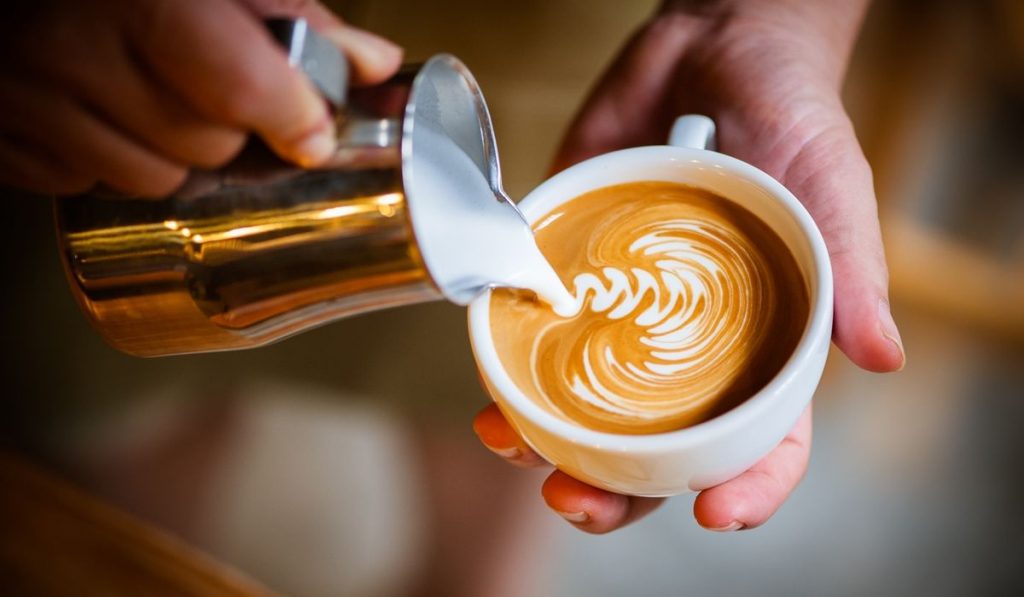
Do you like Coffee or not ?
Coffee is a brewed drink prepared from roasted coffee beans, the seeds of berries from certain flowering plants in the Coffea genus. From the coffee fruit, the seeds are separated to produce a stable, raw product: unroasted green coffee. The seeds are then roasted, a process which transforms them into a consumable product: roasted coffee, which is ground into fine particles that are typically steeped in hot water before being filtered out, producing a cup of coffee.

Coffee is darkly colored, bitter, slightly acidic and has a stimulating effect in humans, primarily due to its caffeine content. It is one of the most popular drinks in the world[4] and can be prepared and presented in a variety of ways (e.g., espresso, French press, caffè latte, or already-brewed canned coffee). It is usually served hot, although chilled or iced coffee is common. Sugar, sugar substitutes, milk or cream are often used to lessen the bitter taste or enhance the flavor. It may be served with coffee cake or another sweet dessert, like doughnuts. A commercial establishment that sells prepared coffee beverages is known as a coffeehouse or coffee shop (not to be confused with Dutch coffeeshops selling cannabis).
Is coffee good or bad for your health?

Although early studies of coffee suggested that it could lead to health problems, recent research provides strong evidence that drinking coffee actually has a variety of health benefits.
“The overall evidence has been pretty convincing that coffee has been more healthful than harmful in terms of health outcomes,” said Frank Hu, chair of the Department of Nutrition at Harvard T.H. Chan School of Public Health, in an April 5, 2021, article in Discover. “For most people, moderate coffee consumption can be incorporated into a healthy diet.”
Hu said that moderate coffee intake—about 2–5 cups a day—is linked to a lower likelihood of type 2 diabetes, heart disease, liver and endometrial cancers, Parkinson’s disease, and depression. It’s even possible that people who drink coffee can reduce their risk of early death.
Early research linked coffee to diseases ranging from heart disease and asthma. But Hu noted that many participants in those studies also smoked, which may have led researchers to think that coffee was responsible for the adverse effects that are now linked with cigarettes. He added that anything people consume a lot of tends to come under scrutiny. “In the past, I think a lot of people thought, ‘Oh, coffee’s so delicious, there must be something bad about coffee,’” he said. “So I think the good news is that [for] most people, coffee actually confers some health benefits.”
Certain groups should be careful about drinking coffee, according to the article. Not much is known about the effects of coffee on children, and caffeine could be harmful to pregnancies. Too much caffeine can also cause anxiety in people with panic or anxiety disorders.
For those who drink coffee, experts suggest brewing it with a paper filter, because unfiltered coffee is associated with higher rates of early death, and can contain compounds that raise levels of LDL, or “bad,” cholesterol. They also advise not going overboard with added cream or sugar.
What happens if you drink coffee everyday?

According to Beth Witherspoon, registered dietitian consultant for Community Coffee Company, “Moderate coffee consumption (3-5 cups daily) may be linked to decreased mortality from all causes, reduced risk of developing type 2 diabetes, and decreased risk of Parkinson’s disease, dementia, liver cirrhosis, and certain cancers, including liver and endometrium.” Experts have even referred to coffee as a “miracle drug,” due to its miraculous ability to prevent such diseases. “Basically it helps you live longer,” says Janet Rich Pittman, Dementia Prevention Specialist and Senior Health Adviser, known as The Brain Nerd. Experts make note, however, that coffee’s benefits are best attained with black caffeinated coffee. “For the antioxidants to work…you’ve got to give up your cream and sugar,” says Pittman. (If you can’t, here’s a healthy homemade creamer recipe you should try.)
When taken by mouth: Coffee is LIKELY SAFE for most healthy adults when consumed in moderate amounts (about 4 cups per day). Coffee containing caffeine can cause insomnia, nervousness and restlessness, stomach upset, nausea and vomiting, increased heart and breathing rate, and other side effects.
Caffeinated coffee is POSSIBLY UNSAFE when taken by mouth for a long time or in high doses (more than 4 cups per day). Drinking large amounts of caffeinated coffee might cause headache, anxiety, agitation, ringing in the ears, and irregular heartbeats. Larger doses might cause headache, anxiety, agitation, and chest pain.
When given as an enema (rectally): Coffee is POSSIBLY UNSAFE when given rectally as an enema. Coffee enemas have been linked to cases of severe side effects, including death.
Special Precautions and Warnings
Pregnancy and breast-feeding: Caffeinated coffee is POSSIBLY SAFE for pregnant women in amounts of 3 cups per day or less. This amount of coffee provides about 300 mg of caffeine. Consuming larger amounts during pregnancy or when breast-feeding is POSSIBLY UNSAFE. Drinking more than 3 cups per day during pregnancy has been linked to an increased risk of miscarriage, premature birth, and low birth weight. These risks increase as the amount of coffee the mother drinks during pregnancy increases. Also, caffeine can pass into breast milk, so nursing mothers should closely monitor caffeine intake to make sure it is on the low side (1-2 cups per day). High intake of caffeine by nursing mothers can cause sleep problems, irritability, and increased bowel activity in breast-fed infants.
How to drink coffee in a healthy way

The following doses have been studied in scientific research:
BY MOUTH:
- For headache or improving mental alertness: The typical dose of caffeine is up to 250 mg per day, which is about 2 cups of coffee. Even a single cup of coffee with caffeine can be used.
- For Parkinson disease: 3-4 cups of caffeinated coffee per day or 421 mg to 2716 mg total caffeine. However, a significantly lower risk of developing Parkinson disease has also been associated with as little as 124 mg to 208 mg of caffeine (approximately one to two cups of coffee).
- For death from any cause: At least one cup of ground, instant, or decaffeinated coffee per day has been used long-term.
- For diabetes: 900 mg caffeine per day (six or more cups of coffee per day) long-term.
- Impaired movement of food through the intestines after surgery: 100 mL of coffee three times a day starting after surgery and continuing until the first bowel movement has been used.
The choice of coffee, grind, amount of coffee to water, and other factors determine flavor and strength of coffee.
Brewed coffee contains around 100-150 mg caffeine per cup. Instant coffee contains 85-100 mg caffeine per cup. Decaffeinated coffee contains approximately 8 mg caffeine per cup. Darker roasts contain less caffeine due to the roasting process.
From that first cup in the morning to the occasional afternoon treat, coffee is a beloved and popular drink. In fact, Americans now drink more coffee than ever. Coffee consumption is up by 5% since 2015 — and 62% of Americans drink coffee every day.1 Its popularity has even spilled into internet culture with the trendy saying, “But first, coffee.”
Drinking coffee and tea has also been linked to a range of health benefits for the brain, lungs, liver, metabolism, and more.2 But what happens when we add too much milk, cream, or sweetener? A coffee drink loaded with sugar and calories can turn into an unhealthy beverage choice. The good news is you can still have your coffee and make it healthy.
To help get new ideas brewing, Sean Hashmi, MD, physician and regional director of weight management and clinical nutrition for Kaiser Permanente Southern California, shares these recommendations on how to drink your coffee — and feel good about it.
Drink it black
The healthiest way to drink coffee is plain with nothing added — also known as drinking it black. Dr. Hashmi explains, “Ideally, you shouldn’t put sugar in your coffee. If you train your taste buds to have your coffee sweetened, you’ll crave that sweetness like an addiction.” We know that when it comes to sugar and sweeteners, less is always best.
Try plant-based milks
If you’re adding milk to your coffee, unsweetened plant-based milks usually have less sugar than regular cow’s milk. “Replacing dairy milk with a nut-based milk is a healthy habit that can reduce saturated fats than can cause issues like heart disease and diabetes,” says Dr. Hashmi.
Spice it up
There are some spices like cinnamon, nutmeg, cacao, and ginger that have a natural sweetness and flavor to them. You can add them to your coffee grounds before brewing or sprinkle them directly in your cup for a change of taste. For another buzz-worthy recipe, try making your own cold brew coffee. Brewing at a lower temperature can give you a smooth coffee that’s lower in acidity and bitterness.
Consider the caffeine
The maximum recommended amount of caffeine per day is 400 milligrams, which is about 4 cups of brewed coffee. So, if you’re drinking more than 4 cups of coffee per day, you should try a combination of caffeinated and decaffeinated. Keep in mind some coffee shop drinks have more than 1 cup per serving, depending on the size. Dr. Hashmi says, “It’s also a good idea to avoid caffeinated beverages after 10 a.m. Consuming caffeine throughout the day can lead to a jittery feeling or sleep issues at night.”
Be good to your body
Dr. Hashmi explains, “There are many benefits to drinking coffee, but you have to be mindful about how you drink it. When it comes to nutrition, I like to think that what you put in your body must have a good ROI (return on investment). If you don’t get anything nutritious out of it, it’s not worth your time.”
Reference

Good night all guys ❤️💤
Hello 🤗 everyone
Good evening 🌌
Thanks for sharing Author
Favorite ☕
Yes, I’m coffee lover ☕
💕💕
I like hot drinks…. coffee and tea ☕
It’s very interested article. I love it and also like coffee so much 😍
Really like latte coffee ☕️
Coffee actually confers some health benefits😉
Coffee ☕
How to drink coffee in healthy way
🫖🍮🫖🍮☕☕🍵☕
With a cup of coffee ☕ you can reduce stress
With a cup of coffee ☕ you can reduce your heart aches too😎
All about coffee ☕
Coffee is good for anytime 🙂
You are so awesome! I don’t suppose I’ve read throough anything like
this before. So wondedrful to find another perrson with some original
thoughts on this subject. Seriously.. thank you
for starting this up. This site iis one thing that
is needed on the web, someone with a bit off originality!
I love Starbucks coffee ☕😋
🍮🍮🍮🍮🍮☕☕☕☕🫖🫖🫖
Like coffee ☕🌞
Yes I do
I’m coffee lover ☕
Any form of coffee is lovely that what I think😋
I can’t live without coffee ☕
I love coffee 😋 especially from Starbucks 😂
ပုံမှန်လေးတစ်ခွက် နဲ့ ပုံမှန်ဆည်းဆာ
ချိန်မှာ
ဟိုအကြောင်း
ဒီအကြောင်း
တချို့အတ္တသမားတွေအကြောင်း
စကားလက်ဆုံကျ
ချင်သေးတယ်
အရူးလေးတို့ရေ
မသေအောင်
ဂရုစိုက် ကြ ။
Coffee is like
Good
Yes ok
Thanks 😍
လဘက်ရည်ပိုကြိုက်
Like it
Thanks for the article about trivia of Coffee!
☕☕☕
One of my favourites.☕🥰
We must win 2022💪
Yes.
Thanks for sharing this article.
I usually drink 1 cup of coffee per day.
I want to drink a cup of coffee.
yes
i like coffee ❤
I like it
I like it
ကော်ဖီလည်းသောက်တယ်
လက်ဖက်ရည်ကိုပိုကြိုက်တယ်
Yes, I do
Coffee is the best 👌
Drink coffee, revolt military.
Thanks…I’like it.
Love to have nice coffee every day. Thanks for sharing this useful information.
Yes, like it.
i like it
Why not?😊
I like coffee
I can’t drink coffee but I like to drink and really love it’s smell.
Done